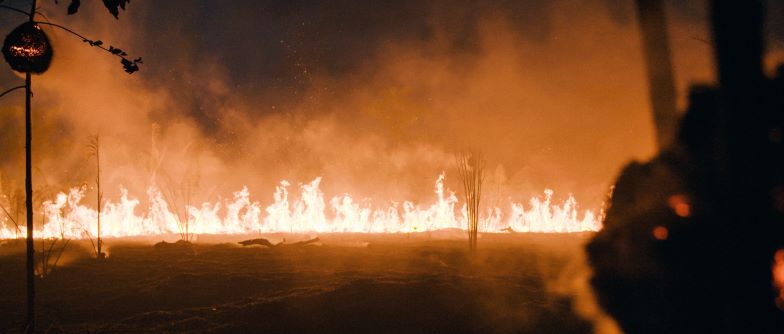It’s a truism that resisting authoritarianism has been a common theme in both art and journalism, at least since Trump was elected president. This past year alone produced multiple feature films fascinated with the rise of fascism (Fabian: Going to the Dogs) and the various Communist regimes after World War II (Great Freedom, Servants, Firebird, January). The following documentaries, now streaming, offer three real-life stories of resistance and repression, and in each, the emphasis is on hope.
The Territory brings us to an area of uncultivated rainforest in modern-day Brazil. It is the last holdout of the Indigenous Uru-Eu-Wau-Wau people, who have lived off the land for centuries—they were not discovered by non-natives until 1981. Director Alex Pritz focuses on a recent chapter in their struggle for survival, which, over the years, has seen them combat deforestation, disease, and violent attacks. All three of the above are present here as settlers, encouraged by President Jair Bolsanaro’s incendiary speeches, invade and burn protected indigenous land—Bolsanaro promises to all but clear the Amazon for development, and Covid-19 proves an especially dangerous threat to the Uru-Eu-Wau-Wau.
Viewers will not once be confused as to the moral stance of the filmmakers: The climactic event is a covert, and very successful, operation the tribe undertakes to fight back against the settlers who have illegally intruded upon their land. That being said, Pritz also brings viewers into the world of a few of the settlers, who genuinely believe they have a right to the land they are trying to possess.
Most impressively, the filmmakers create a genuinely immersive portrait of the Uru-Eu-Wau-Wau’s way of life within an 83-minute running time. With gorgeous photography, the filmmakers capture intimate details of tribe life, awe-inspiring portraits of nature, as well as more chilling sights (a bird’s-eye view of deforestation). Many images will doubtless linger in the minds of viewers. (Streaming on Disney+)
If The Territory shows us Brazil in the shadow of Bolsanaro, Navalny exposes Russia under Vladimir Putin, with a mix of interviews, news excerpts, and footage of lawyer/politician Alexei Navalny and his team at work. At a clipped pace, filmmaker Daniel Roher focuses on Navalny’s struggle against Putin. Navalny, whom Putin refuses to mention by name, and whose mastery of social media and powerful speeches have gained considerable force, was poisoned in 2020 while traveling. After a troublingly complex process to transfer him out of a Siberian hospital, Navalny was treated in Germany. After his recovery, he was relocated to a small Black Forest village, where he was contacted by Christo Grozev, a Bulgarian hacker, who convinced him to investigate his attempted assassination.
For those looking to understand the ins and outs of this incident, Roher provides an engaging and thorough investigation. With clarity and energy, he gives us a play-by-play of each step in this process, occasionally stepping back to take a look at the Navalny family and their anxieties. Most striking is how blunt Putin’s attempt on Navalny’s life was: He used his signature poison, and the assassins were easy to trace and to fool. Grozev is lucid and convincing when he describes how quickly he was able to find suspects, and there certainly are moments of schadenfreude as we picture Putin’s anger and humiliation. Yet I found myself longing for more discussion of Navalny’s politics, which are not spoken of except in generalizations, and of his past, though these were perhaps out of the scope of this project, which is more a work of investigative journalism than biography.
Navalny, in spite of the waves he made on social media, is now in a Russian prison. Though Putin’s “stupidity” is repeatedly emphasized, the Russian president seems to be firmly in control. Given the state of things, one wonders if “brazen” is a better word than “stupid” when it comes to describing Russia’s current leader. Still, Navalny predicts in an interview (preceding his incarceration) that if Putin puts him in jail, it is only proof that he and the opposition are indeed a threat. (HBO Max)
The Janes illuminates a not so distant, repressive past. Chicago of the 1960s and early ’70s saw the convergence of many of the hottest issues of the day (racism, civil rights, student protests), and also saw the emergence of an underground network, the Janes. You would call a phone number, ask for “Jane,” and then a counselor would help you procure an illegal abortion.
Though occasionally this documentary yields to sentimentality (often in its choice of music), it is a strong, nuanced, and wide-ranging survey of the organization and its work. Through interviews with the surviving Janes, their longtime abortionist who went by “Mike,” as well as archival footage, Emma Pildes and Tia Lessin’s film manages to encompass the context from which they emerged. This includes the technicalities of their operations (both procedural and administrative), the myriad dangers women who sought abortions faced (as well as the dangers of the procedure itself), and the frightening situations many of them were in. The subjects share a willingness to scrutinize their own biases and limitations (most of them were middle-class White women, only one Jane was Black), and they seem to have made an attempt as an organization to overcome them. This film is also full of unlikely stories and bits of information (Mike, we learn, turned to abortions because it was good money), and richly brings its time and its people alive.
There is an unintentionally sad sequence in which the Janes discuss how happy they were when Roe v. Wade made it through the Supreme Court in favor of women’s rights. So, you’d think that watching The Janes would be beyond depressing after the Supreme Court’s Dobbs v. Jackson decision this year. However, this is, in fact, the most uplifting film on this list; we see how a group of people did what must be done, regardless of the circumstances, and lived outside the law by choice. It is a firm, straightforward reminder of what is possible. (HBO Max)









Leave A Comment